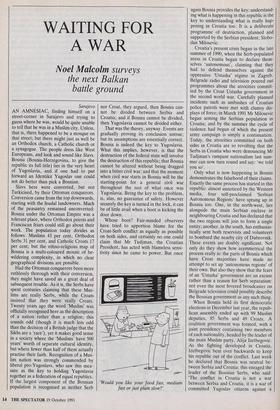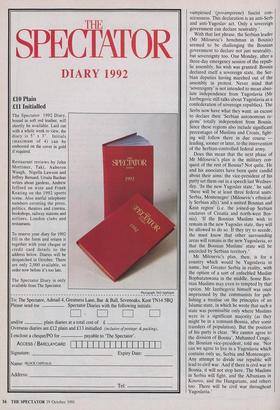WAITING FOR A WAR
Noel Malcolm surveys
the next Balkan battle ground
Sarajevo AN AMNESIAC, finding himself on a street-corner in Sarajevo and trying to guess where he was, would be quite unable to tell that he was in a Muslim city. Unless, that is, there happened to be a mosque on that street; but there might just as well be an Orthodox church, a Catholic church or a synagogue. The people dress like West Europeans, and look and sound like Slays. Bosnia (Bosnia-Herzegovina, to give the republic its full title) lies in the very heart of Yugoslavia, and if one had to put forward an Identikit Yugoslav one could not do better than pick a Bosnian.
Slays here were converted, but not Turkicised, by their Ottoman conquerors. Conversion came from the top downwards, starting with the feudal landowners. Much of the peasantry remained unconverted: Bosnia under the Ottoman Empire was a tolerant place, where Orthodox priests and Franciscan friars could still go about their work. The population today divides as follows: Muslims 43 per cent, Orthodox Serbs 31 per cent, and Catholic Croats 17 per cent; but the ethno-religious map of Bosnia is a multi-coloured mosaic of be- wildering complexity, in which no clear geographical divisions are possible.
Had the Ottoman conquerors been more ruthlessly thorough with their conversion, they might have saved us a great deal of subsequent trouble. As it is, the Serbs have spent centuries claiming that these Mus- lims are really Serbs, while the Croats insisted that they were really Croats. Twenty years ago the word 'Muslim' was officially recognised here as the description of a nation rather than a religion; this sounds odd (though it is much less odd than the decision of a British judge that the Sikhs are a 'race), yet it makes good sense in a society where the 'Muslims' have 500 years' worth of separate cultural identity, but where fewer than half of them actually practise their faith. Recognition of a Mus- lim nation was strongly commended by liberal pro-Yugoslays, who saw this mea- sure as the key to holding Yugoslavia together as a federation of equal republics. If the largest component of the Bosnian population is recognised as neither Serb nor Croat, they argued, then Bosnia can- not be divided between Serbia and Croatia; and if Bosnia cannot be divided, then Yugoslavia cannot be divided either.
That was the theory, anyway. Events are gradually proving its conclusion untrue; but its assumptions are essentially correct. Bosnia is indeed the key to Yugoslavia. What this implies, however, is that the destruction of the federal state will involve the destruction of this republic; that Bosnia cannot be altered without being dragged into a bitter civil war; and that the moment when civil war starts in Bosnia will be the starting-point for a general civil war throughout the rest of what once was Yugoslavia. Being the key to the problem, is, alas, no guarantee of safety. However securely the key is turned in the lock, it can be of little avail when a boot is kicking the door down.
Whose boot? Fair-minded observers have tried to apportion blame for the Croat-Serb conflict as equally as possible on both sides, and certainly no one could claim that Mr Tudjman, the Croatian President, has acted with blameless sensi- tivity since he came to power. But once 'Would you like your food fast, medium fast or just plain slow?' again Bosnia provides the key: understand- ing what is happening in this republic is the key to understanding what is really hap- pening in Croatia too. It is a deliberate programme of destruction, planned and supported by the Serbian president, Slobo- dan Milosevic.
Croatia's present crisis began in the late summer of 1990, when the Serb-populated areas in Croatia began to declare them- selves 'autonomous', claiming that they had to defend themselves against the oppressive `Ustasha' regime in Zagreb. Belgrade radio and television poured out programmes about the atrocities commit- ted by the Croat Ustasha government in the second world war. Carefully planned incidents such as ambushes of Croatian police patrols were met with clumsy dis- plays of force; in March 1991 Mr Milosevic began arming the Serbian population in Croatia; and by the summer the cycle of violence had begun of which the present army campaign is simply a continuation. Today, the atrocities committed on both sides in Croatia are so revolting that the Serbs in Croatia who were denouncing Mr Tudjman's rampant nationalism last sum- mer can now turn round and say: 'we told you so'.
Only what is now happening in Bosnia demonstrates the falsehood of their claims. Exactly the same process has started in this republic: almost unnoticed by the Western media, four self-proclaimed 'Serbian Autonomous Regions' have sprung up in Bosnia too. One, in the north-west, lies alongside the main Serbian enclave in neighbouring Croatia and has declared that the two regions will join to form a single entity; another, in the south, has enthusias- tically sent both reservists and volunteers to bombard the nearby city of Dubrovnik. These events are doubly significant. Not only do they show how asymmetrical the process really is: the parts of Bosnia which have Croat majorities have made no attempt to set up 'autonomous regions' of their own. But also they show that the fears of an `Ustasha' government are an excuse rather than a reason for Serb separatism: not even the most fevered broadcaster on Belgrade television could possibly describe the Bosnian government as any such thing.
When Bosnia held its first democratic elections in December last year, the repub- lican assembly ended up with 99 Muslim deputies, 85 Serbs and 49 Croats. A coalition government was formed, with a joint presidency containing two members of each nationality, headed by the leader of the main Muslim party, Alija Izetbegovic. As the fighting developed in Croatia, Izetbegovic bent over backwards to keep his republic out of the conflict. Last week he declared that Bosnia was neutral be- tween Serbia and Croatia: this enraged the leader of the Bosnian Serbs, who said: 'The conflict in Croatia is not a war between Serbia and Croatia, it is a war of committed Yugoslav citizens against a vampirised (povampirene) fascist con- sciousness. This declaration is an anti-Serb and anti-Yugoslav act. Only a sovereign government can declare neutrality.'
With that last phrase, the Serbian leader (Mr Milosevic's henchman in Bosnia) seemed to be challenging the Bosnian government to declare not just neutrality, but sovereignty too. One Monday, after a three-day emergency session of the repub- lic assembly, his wish was granted: Bosnia declared itself a sovereign state, the Ser- bian deputies having marched out of the assembly in protest. Never mind that 'sovereignty' is not intended to mean abso- lute independence from Yugoslavia (Mr Izetbegovic still talks about Yugoslavia as a confederation of sovereign republics). The Serbs now have what they want: an excuse to declare their `Serbian autonomous re- gions' totally independent from Bosnia. Since these regions also include significant percentages of Muslims and Croats, fight- ing will follow there in due course — leading, sooner or later, to the intervention of the Serbian-controlled federal army.
Does this mean that the next phase of Mr Milosevic's plan is the military con- quest of the rest of Bosnia? Not quite. He and his associates have been quite candid about their aims: the vice-president of his party set them out in a speech last Wednes- day. 'In the new Yugoslav state,' he said, 'there will be at least three federal units: Serbia, Montenegro' (Milosevic's ethnical- ly Serbian ally) 'and a united Bosnian and Knin region' (i.e. the joined-up Serbian enclaves of Croatia and north-west Bos- nia). 'If the Bosnian Muslims wish to remain in the new Yugoslav state, they will be allowed to do so. If they try to secede, the must know that other surrounding areas will remain in the new Yugoslavia, so that the Bosnian Muslims' state will be encircled by Serbian territory.'
Mr Milosevic's plan, then, is for a country which would be Yugoslavia in name, but Greater Serbia in reality, with the option of a sort of enfeebled Muslim Bophutatswana in the middle. Some Bos- nian Muslims may even to tempted by that option. Mr Izetbegovic himself was once imprisoned by the communists for pub- lishing a treatise on the principles of an Islamic state, in which he wrote that such a state was permissible only where Muslims were in a significant majority (as they might be in a remnant-Bosnia, after some transfers of population). But the position of his party is clear. 'We cannot agree to the division of Bosnia', Muhamed Cengic, the Bosnian vice-president, told me. 'Nor can we agree to live in a Yugoslavia which contains only us, Serbia and Montenegro. Any attempt to divide our republic will lead to civil war. And if there is civil war in Bosnia, it will not stop here. The Muslims in Serbia will fight, and the Albanians in Kosovo, and the Hungarians, and others too. There will be civil war throughout Yugoslavia.'



























































 Previous page
Previous page